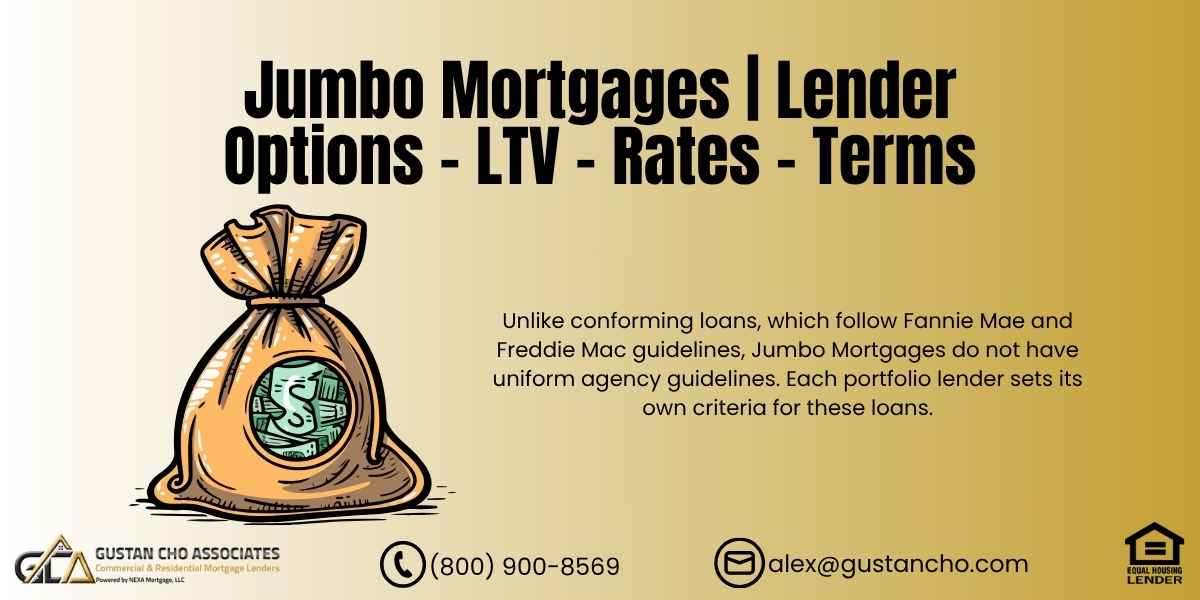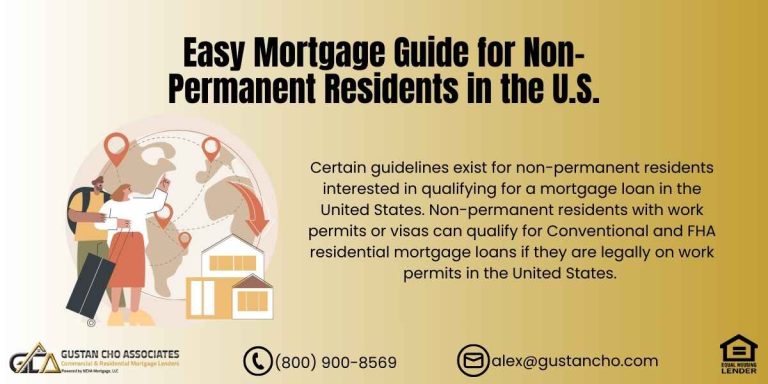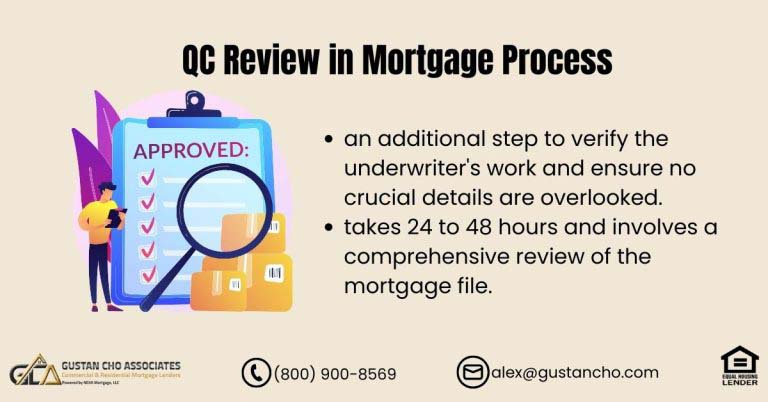Jumbo Mortgages are home mortgage loans that are higher than the conforming loan limit. The conforming loan limit for 2024 is $766,550. Conforming mortgage loans are mortgage loans that conform to Fannie Mae and Freddie Mac Guidelines. Fannie Mae and Freddie Mac have caps on conforming loan limits. Every year, the Federal Housing Finance Agency sets a maximum loan limit on conforming loan for median priced and high-cost areas throughout the United States.
The 2024 cap for conforming loans in median-priced counties is $766,550. Conforming loan limit for high-cost counties in the United States is capped at $1,149,825. Loan limit in high cost counties range between $766,550 to $1,149,825.
Homebuyers who are looking to finance higher than the $766,550 maximum conforming limit need to qualify for Jumbo Mortgages. There are no set agency guidelines on Jumbo loans since they do not have a uniform agency guidelines. Lenders of jumbo mortgages are portfolio lenders. Therefore, each portfolio lender sets its own guidelines on jumbo mortgages.
Understanding Traditional and Non-QM Jumbo Mortgages
There are two classes of jumbo mortgages: Traditional and non-QM jumbo loans. Traditional jumbo mortgages are home loans that exceed the conforming loan limits set by the Federal Housing Finance Agency (FHFA). These limits vary by location but generally exceed $766,550 for most areas in 2024. Jumbo loans are used to finance luxury homes and properties in high-cost areas.
Looking for a Jumbo Mortgage? Get Financing for Your Dream Home Today!
Contact us today to learn more about your jumbo mortgage options and get pre-approved!
Key Features of Traditional Jumbo Mortgages
Key features of jumbo mortgage loans is they exceed conforming loan limits. Mortgage rates on jumbo loans are higher than conforming loans but are competitive depending on the lender and borrower’s financial profile. Qualification requirements are stricter compared to conforming loans. Borrowers typically need higher credit scores for traditional full-doc jumbo loans. Generally 700 or above. Traditional jumbo loans require lower debt-to-income ratio usually below 43%. Jumbo loans require substantial down payments typically 10% to 20% depending on the borrower’s credit and income profile. Mortgage lenders of jumbo loans require significant cash reserves. Proof of several months of mortgage payments in reserve.
Lenders of Jumbo Mortgages
Not all lenders originate and fund jumbo loans. The following lenders originate jumbo mortgages:
- Banks and Credit Unions: Many large financial institutions offer jumbo loans.
- Mortgage Bankers and Correspondent Lenders: Mortgage bankers and correspondent lenders can offer jumbo loans.
- Mortgage Brokers: Mortgage brokers are you best source to finding the best rates and terms on jumbo loans. Mortgage broker cCan help find competitive rates and terms since they have lending relationships with dozens or hundreds of wholesale mortgage lenders.
Non-QM (Non-Qualified Mortgage) Jumbo Mortgages
Definition: Non-QM jumbo mortgages are loans that do not meet the Consumer Financial Protection Bureau (CFPB) standards for Qualified Mortgages (QM). These standards include certain guidelines to ensure the borrower can repay the loan. Non-QM loans are designed for borrowers who may still need to meet the traditional criteria but are still financially capable.
Key Features of Non-QM Jumbo Loans
Non-QM Jumbo loans are portfolio loans that are offered as Non-Qualified Jumbo loans. There are many different types of non-QM jumbo loans. Non-QM Jumbo mortgages are ideal for self-employed borrowers or borrowers with credit scores down to 600 FICO, no-income verification borrowers, and borrowers with less than perfect credit.
- Flexible Qualification Criteria: Non-QM loans cater to borrowers with unique financial situations, such as:
- Self-Employed: May use bank statements or other documentation to verify income.
- Credit Challenges: Can work with lower credit scores.
- Recent Credit Events: Such as bankruptcy or foreclosure.
- Interest Rates: Often higher than traditional jumbo loans due to increased risk.
- Loan Amounts: Similar to traditional jumbo loans, exceeding conforming loan limits.
- Down Payments: Typically higher than traditional jumbo loans, though this can vary.
Lenders of Non-QM Jumbo Mortgages
- Specialized Lenders: Many non-QM lenders specialize in these types of loans.
- Mortgage Brokers: Can help identify non-QM lenders and suitable loan products.
Pros and Cons of Traditional Jumbo Loans
Pros of traditional jumbo loans are lower interest rates compared to non-QM loans.. Standard Qualification: Well-defined requirements.. Lower Fees: Generally, there are fewer fees compared to non-QM loans.
Cons of Traditional Jumbo Mortgages
Stricter Requirements: High credit scores, low DTI, and significant down payments are required. Less Flexibility: Limited options for those with unconventional financial situations.
Non-QM Jumbo Mortgages
Pros of non-QM Jumbo loans include flexible qualification requirements. Non-QM jumbo loans accommodates a wider range of financial situations. Credit Flexibility: Available to those with credit challenges. Alternative Documentation: Allows for different forms of income verification.
Cons of Non-QM Jumbo Loans
Higher Interest Rates: Reflecting the increased risk to lenders. Higher Fees: This may include additional fees compared to traditional loans. Limited Availability: Fewer lenders offer non-QM loans. Choosing between traditional and non-QM jumbo mortgages depends on your financial situation and specific needs. Traditional jumbo mortgages offer better rates and terms for those who meet stringent requirements, while non-QM jumbo mortgages provide flexibility for borrowers with unique financial profiles. Consulting with a mortgage broker can help determine the best option for your circumstances.
Ready for a Jumbo Mortgage? Let Us Help You Secure Financing for Your Dream Home!
Reach out now to find out how we can help you qualify and get the best rates on your jumbo loan.
What Are the Lending Guidelines on Jumbo Mortgages?
Each individual Jumbo lender will set up their own mortgage guidelines on Jumbo loans. Lenders of Jumbo loans are portfolio lenders. A portfolio lender is a lender who keeps the loan in-house after it funds. Portfolio lenders can keep the loan in their fund or they may sell the loan to the secondary market with a specific investor. Each individual lender sets its own mortgage guidelines on loan to value, credit score requirements, rates, and terms.
Mortgage Options on Jumbo Mortgages
There is a variety of Jumbo Mortgages. Any mortgage loan that is higher than $647,200 is called a non-conforming mortgage loan, or Jumbo Mortgage unless the property is in a high-cost area. Jumbo Mortgage loans are often viewed as riskier loans by lenders. Mortgage lending requirements on jumbo loans are tougher than conforming loans.
Qualifying for Jumbo Mortgages
Most Jumbo Mortgage lenders do expect mortgage applicants with higher credit scores and lower debt to income ratios as well as larger down payments. Jumbo mortgage lenders require an 80% down payment on a home purchase and a minimum credit score of 680. There are Jumbo Mortgage loan programs that allow 85% to 90% loan to value with no private mortgage insurance required. Gustan Cho Associates offer 90% LTV jumbo mortgages with up to a 50% DTI and credit scores down to a 660 FICO.
Jumbo Mortgages With High Debt-to-Income Ratio
Jumbo loans where borrowers do not have to pay annual mortgage insurance are called Lender Paid Mortgage Insurance, commonly referred to as LPMI. The 10% down payment with no private mortgage insurance Jumbo Mortgage loan program does require a minimum credit score of 660 FICO and a debt to income ratio that cannot be greater than 50% debt-to-income ratios.
Jumbo Mortgages After Bankruptcy
Jumbo mortgage loan applicants with a prior bankruptcy, foreclosure, deed-in-lieu of foreclosure, or short sale will have a rather difficult time qualifying for a Jumbo mortgage. At best, there is at least a 7-year waiting period in order to qualify for a Jumbo mortgage after a bankruptcy, foreclosure, deed-in-lieu of foreclosure, or short sale. Jumbo loans one day out of bankruptcy or foreclosure are offered at Gustan Cho Associates with non-QM jumbo mortgages with a 30% down payment. Gustan Cho Associates has a non-QM Jumbo mortgage program for borrowers with credit scores down to 550 FICO. There are a few Traditional Jumbo Lenders that offer Jumbo mortgages to borrowers with under 660 credit scores. However, debt-to-income ratios cannot exceed 40% DTI, and compensating factors are required.
Basics on Jumbo Mortgages
Under the eyes of mortgage lenders that specialize in Jumbo mortgages, Jumbo Loans are considered risky. This is because a higher-end home cannot be liquidated as easily as a traditional average-size home in the event the Jumbo mortgage loan borrower defaults and the property is taken back by the mortgage lender via foreclosure.
It may take months or sometimes more than a year or two to resell a high-end home or unique property whereas it only takes a fraction of that time to sell an average-size home.
Due to this risk factor, Jumbo mortgage lenders want strong borrowers and have higher credit standards with regard to down payment requirements, credit scores, income, and debt to income ratios. A large down payment proves that the Jumbo Mortgage loan borrower has skin in the game. A low debt to income ratio also provides less risk to the lender. Reserve is a strong compensating factor.
Loan-to-Value Requirements on Jumbo Mortgages
Jumbo mortgages under $1,000,000, standard down payment requirements is 80% loan to value. For best jumbo mortgage rates, a 75% loan-to-value is normally required. There are Jumbo mortgage Lender that offers Jumbo mortgage loan programs of 85% loan to value and 90% loan to value. Please note that the 90% loan to value Jumbo mortgage loan program requires 660 credit scores and a maximum 50% debt-to-income ratio.
Ready to Buy a High-Value Home? Explore Jumbo Mortgage Options with Us!
Reach out today to discuss your needs and get pre-approved for a jumbo loan that fits your goals.
Super Jumbo Mortgage Loans
Super Jumbo mortgages are for higher-end homes with minimum Jumbo mortgage loan amounts of $3 million. There are no maximum loan amount on the Super Jumbo mortgage loan program and no standard underwriting guidelines. Each Super Jumbo mortgage Loan application is underwritten in a case-to-case scenario. Super Jumbo loans are all portfolio 30-year adjustable-rate mortgage loans available as 3/1 ARM, 5/1 ARM, and 7/1 ARM.
FAQs: Jumbo Mortgages | Lender Options – LTV – Rates – Terms
1. What is a Jumbo Mortgage? In 2024, Jumbo Mortgages allow borrowers to go over the limit set by the Federal Housing Finance Agency. The limit is $766,550 in average-priced areas, but it can go up to $1,149,825 in high-cost areas.
2. What is the conforming loan limit for 2024? The 2024 conforming loan ceiling is $766,550 for counties with median home prices. In high-cost counties, the limit ranges between $766,550 and $1,149,825.
3. Who sets the guidelines for Jumbo Mortgages? Unlike conforming loans, which follow Fannie Mae and Freddie Mac guidelines, Jumbo Mortgages do not have uniform agency guidelines. Each portfolio lender sets its own criteria for these loans.
4. What are the types of Jumbo Mortgages? There are two main types of Jumbo Mortgages: Traditional Jumbo Mortgages and Non-QM (Non-Qualified Mortgage) Jumbo Mortgages. Traditional jumbo loans exceed the conforming limits, while non-QM jumbo loans cater to borrowers who do not meet the Consumer Financial Protection Bureau (CFPB) standards for qualified mortgages.
5. What are the key features of Traditional Jumbo Mortgages? Traditional Jumbo Mortgages are characterized by several key features. They include loans that exceed conventional loan limits and often have higher mortgage rates than conforming loans. The qualification requirements are also more stringent, demanding high credit scores, typically 700 or above, lower debt-to-income ratios, generally below 43%, substantial down payments ranging from 10% to 20%, and significant cash reserves.
6. Who offers Jumbo Mortgages? Jumbo mortgages are offered by banks and credit unions, mortgage bankers and correspondent lenders, and mortgage brokers who can assist in finding competitive rates and terms.
7. What are Non-QM Jumbo Mortgages? Non-QM Jumbo Mortgages are designed for borrowers who do not meet the standard criteria for qualified mortgages. These loans often cater to self-employed individuals, those with lower credit scores, or borrowers with unique financial situations.
8. What are the benefits of non-QM jumbo Mortgages? Non-QM jumbo mortgages offer several benefits, including flexible qualification criteria, the ability to work with lower credit scores, alternative documentation for income verification, and suitability for borrowers with recent credit events like bankruptcy or foreclosure.
9. What are the drawbacks of non-QM jumbo Mortgages? The drawbacks of non-QM jumbo mortgages include higher interest rates, which arise from the increased risk. In addition, these mortgages often come with higher fees than traditional loans. They are less available since fewer lenders offer non-QM loans.
10. How do interest rates for Jumbo Mortgages compare to conforming loans? Jumbo home loans usually come with higher interest rates than those of conforming loans. The lender and the borrower’s financial situation will determine the specific interest rate for a mortgage.
11. What are the down payment requirements for Jumbo Mortgages? Down payment requirements for Jumbo Mortgages range from 10% to 20%, depending on the borrower’s credit and income profile. Some programs offer up to 90% loan-to-value without private mortgage insurance, with specific conditions.
12. Can you qualify for a Jumbo Mortgage after bankruptcy? Qualifying for a Jumbo Mortgage after bankruptcy can be challenging. After filing for bankruptcy, having a foreclosure, deed-in-lieu of foreclosure, or a short sale typically has a waiting period of 7 years. However, some non-QM Jumbo loan programs may offer options with significant down payments and higher interest rates.
13. What is a Super Jumbo Mortgage Loan? These loans are for high-end homes with minimum loan amounts of $3 million. They are portfolio loans and typically come with adjustable-rate mortgage options like 3/1 ARM, 5/1 ARM, and 7/1 ARM.
14. How can a mortgage broker assist with Jumbo Mortgages? Mortgage brokers can help identify the best rates and terms for Jumbo Mortgages by leveraging their relationships with multiple wholesale mortgage lenders, offering borrowers a range of options tailored to their financial situations.
If you have any questions about Jumbo Mortgages or you need to qualify for loans with a lender with no overlays, please contact us at 800-900-8569. Text us for a faster response. Or email us at alex@gustancho.com. The team at Gustan Cho Associates is available 7 days a week, on evenings, weekends, and holidays.
This blog about Jumbo Mortgages | Lender Options – LTV – Rates – Term was updated on June 20th, 2024.
Need a Jumbo Mortgage for a Larger Home Purchase? Let’s Make It Happen!
Contact us today to discuss your loan options and find out how we can help you secure your high-value home.










